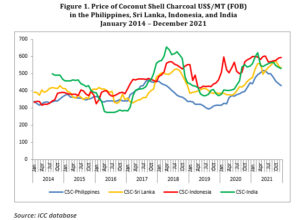Global Trends: Coconut Charcoal Industry
Global Trends: Coconut Charcoal Industry
The coconut charcoal industry is experiencing rapid growth, driven by rising global demand for sustainable and eco-friendly energy solutions. As the world shifts towards greener practices, understanding Global Trends: Coconut Charcoal is crucial for stakeholders in this thriving sector. This article explores the market dynamics, innovations, and future prospects of coconut charcoal, with a focus on its economic and environmental impact.

Rising Demand for Coconut Charcoal
Coconut charcoal has gained popularity due to its versatility and sustainability. Made primarily from coconut shells, this type of charcoal is used in various applications, such as cooking, heating, and industrial processes. Its eco-friendly nature and efficient performance have made it a preferred choice over traditional fuels like wood or coal.
The demand for coconut shell charcoal briquette has surged in recent years, especially in regions such as Europe and North America. These markets value the product’s clean-burning properties and minimal environmental impact. Additionally, the food and beverage industry has embraced coconut charcoal for grilling and smoking, further boosting its market presence.
Innovations in Production and Technology
Advancements in production techniques have significantly improved the quality and efficiency of coconut charcoal. Modern carbonization methods, such as kiln and retort technologies, ensure consistent results while minimizing harmful emissions. Furthermore, innovations in briquette manufacturing have led to the development of high-density, long-lasting products that cater to diverse consumer needs.
The rise of automation and AI-driven processes in manufacturing has also streamlined operations, reducing costs and increasing scalability. These technological breakthroughs are vital in meeting the growing global demand for coconut charcoal products.
Market Opportunities and Challenges
The coconut charcoal industry offers numerous opportunities for growth. Developing countries with abundant coconut resources, such as Indonesia, the Philippines, and India, are well-positioned to become major exporters. Investments in infrastructure and technology can help these regions capitalize on the rising demand.
However, the industry faces challenges, including fluctuating raw material prices and competition from alternative fuels. Ensuring a steady supply of coconut shells and maintaining sustainable practices are essential for long-term success. Addressing these challenges will require collaboration among producers, governments, and industry stakeholders.
Environmental Benefits
One of the key drivers behind the popularity of coconut charcoal is its environmental advantages. By utilizing agricultural waste, such as coconut shells, the industry promotes waste reduction and resource efficiency. The production of coconut shell charcoal briquette also generates fewer greenhouse gas emissions compared to conventional charcoal or fossil fuels.
Moreover, the adoption of sustainable practices, such as reforestation and eco-friendly carbonization, further enhances the industry’s green credentials. These efforts align with global initiatives to combat climate change and transition to renewable energy sources.
Future Prospects
The future of the coconut charcoal industry looks promising, with continued innovation and market expansion on the horizon. Emerging markets in Asia and Africa are expected to drive demand, while developed regions will focus on premium products and sustainability.
Consumer awareness of eco-friendly products will likely fuel growth in the retail segment. High-quality coconut shell charcoal briquette products are already gaining traction among environmentally conscious buyers, highlighting the industry’s potential for further development.
Conclusion
The global trends shaping the coconut charcoal industry reflect a broader shift towards sustainable and renewable energy solutions. By understanding Global Trends: Coconut Charcoal, businesses and consumers can make informed decisions that support environmental conservation and economic growth. As the industry evolves, coconut charcoal will continue to play a pivotal role in creating a cleaner, greener future.








Post Comment